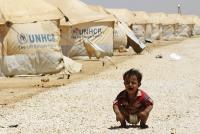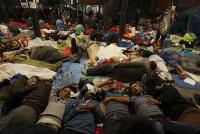-
Israel-Russia communication: Straying Russian plane avoid being shot down

Israel defense minister, Moshe Ya’alon, on Sunday told reporters that a Russian jet recently entered Israeli airspace but was not shot down because Israel and Russia had established an effective open communication system between the two countries. Ya’alon said the plane, by mistake, entered about one mile into Israeli airspace and immediately turned around back to Syria when the Russians were notified.
-
-
Turkey’s, Russia’s official versions of jet shoot down scientifically impossible: Physicists
Two astrophysicists show that the official versions of both Turkey and Russia about the circumstances surrounding the shooting down of a Russian fighter jet over Turkey should be taken with a grain of salt. Turkey’s insists that the Russian jet flew over Turkish territory for 17 seconds, but this is contradicted by the video of the shooting provided by the Turkish military. Russia’s claims that the jet made a 90-dgree turn in order to avoid Turkish airspace does “not correspond to the laws of mechanics.”
-
-
U.K. details strategy to defeat ISIS, remove Assad, rebuild and stabilize Syria
The U.K. government on Thursday released a 36-page dossier offering detailed arguments why it would be militarily, legally, and morally right for Britain to join the U.S.-led coalition in attacking ISIS targets in Syria. The document was released ahead of Prime Minister David Cameron’s speech at the House of Commons in which he called on all House members to vote for allowing the campaign. Cameroon said that ISIS posed a “very direct threat to our country and our way of life” and that inaction by the United Kingdom posed even greater risks for the country.
-
-
France: Syrian government troops to help fight ISIS only after Assad’s removal
Laurent Fabius, France’s foreign minister, said earlier Friday that troops loyal to Bashar al-Assad could be employed in the fight against ISIS, but only as part of a political transition framework in Syria which will not include President Bashar al-Assad. Fabius’s comments highlight the fact that Thursday’s meeting between Francois Hollande and Vladimir Putin has failed to bridge the differences between France and Russia with regard to the war in Syria.
-
-
EC chief: After Paris attacks, Schengen agreement is “comatose”
Jean-Claude Juncker, the president of the European Commission, has admitted that in the wake of the Paris attacks, the Schengen agreement is “comatose” and warned that the euro will not survive without it. Françoise Schepmans, the mayor of the Brussels district of Molenbeek, received a list with the names of more than eighty suspected jihadists living in the area just one month before the Paris attacks.
-
-
NYPD commissioner to Congress: Do not allow people on terror watch list to buy guns
NYPD Commissioner Bill Bratton the other day called on Congress today to “start getting serious” about fixing the loophole which allows individuals on the U.S. terror watch list legally to purchase firearms in the United States. Bratton said: “If Congress really wants to do something instead of just talking about something, help us out with that terrorist watch list, those thousands of people that can purchase firearms in this country. I’m more worried about them than I am about Syrian refugees.”
-
-
N.Y. State Police app helps citizens report suspicious activity
The New York State Police is urging citizens to download a new digital app which allows citizens to capture and report suspicious activity with their smart phones. The app is part of the “See Something, Send Something” campaign which aims to turn willing citizens into the eyes and ears of law enforcement. For example, if a citizen notices an unattended package at a train station of an airport, they could use the app to alert law enforcement.
-
-
Tech companies: weakening encryption would only help the bad guys
Leading technology companies — Apple, Microsoft, Google, Samsung, Twitter, Facebook, and fifty-six other technology companies — have joined forces to campaign against weakening end-to-end encryption, insisting that any weakening of encryption would be “exploited by the bad guys.” Apple’s chief executive Tim Cook recently asserted that “any backdoor is a backdoor for everyone.”
-
-
After Paris, it’s traditional detective work that will keep us safe, not mass surveillance
Before the dust has even settled from the attacks on Paris, familiar calls for greater surveillance powers are surfacing. The desire for greater security is understandable, but that doesn’t mean we should suspend our judgement on the measures proposed to bring it about. It’s widely accepted that intelligence work is the most effective form of counter-terrorism, and that the best intelligence comes from community engagement, not coercion. So we must be wary of the evangelism of those pushing technological solutions to security problems, and the political clamor for mass surveillance.
-
-
Turkey shoots down Russian war plane over Turkey
In a significant escalation of tension along the Syrian-Turkish border, Turkish military aircraft earlier Tuesday shot down a Russian jet after the jet violated Turkey’s airspace. The Turkish announcement said that despite repeated warnings from Turkish F-16 interceptors to turn away, the Russia jet continued to fly over Turkish territory. The incident is a reminder of the growing risks in the increasingly crowded skies over Syria, where planes from the United States, the U.S.-led coalition, Russia, the Syrian air force, France, and, soon, the United Kingdom pursue different missions without a great deal of coordination.
-
-
Bringing matters to a head in Syria
The growing tensions among the major players in Syria is reflection of the different strategic interests of these plays. Iran and Russia would cooperate with the United States in fighting ISIS — but only as part of a strategy to keep the Alawite Assad in power and prevent the Sunni majority from coming to power in Syria. The leading Sunni states have given mostly lip-service to the need to fight ISIS, because Sunnis are not going seriously to fight the fellow Sunnis of ISIS, despicable as they are, unless that campaign is part of a broader strategy to remove Assad and the Alawites from power in Syria, reduce Iran’s influence in Syria and Lebanon, turn Syria into a country run by its Sunni majority, and protect the interests of Iraq’s Sunnis. ISIS is the result — the ugly, deadly result — of growing Sunni grievances since the 2003 U.S. invasion of Iraq. ISIS can be defeated militarily, and it will be defeated, but unless Sunni grievances — in Iraq, in Syria, in Palestine — are effectively addressed, the removal of ISIS from the stage would merely be a prelude to the emrengence of the next ISIS-like group.
-
-
ISIS “trying to obtain chemical, nuclear weapons”: U.K. government
British prime minister David Cameron said yesterday that the government security review has warned that ISIS and al-Qaeda are trying to get their hands on chemical and nuclear weapons. Cameroon referred to the security review in a speech in which he called on Members of Parliament to approve U.K. air strikes in Syria within a week. The British government pledged allocation additional resources for new equipment and the creation of within the Army of two new rapid response “strike brigades” of 5,000 soldiers each. The number of civilian jobs in the Ministry of defense, though, will be heavily reduced.
-
-
German terrorist cell planned to attack German-Holland soccer game last Tuesday
Last Tuesday’s friendly soccer game in Hanover between the national teams of Germany and the Netherland was canceled at the last minute after credible information that terrorists were planning to detonate three bombs inside the stadium during the game. BfV, Germany’s domestic intelligence agency, says there are 1,100 Islamists in Germany, of which 420 are classified as high-risk because of their potential to threaten public safety. These Islamists have exhibited a readiness to use violence.
-
-
FBI director, DHS secretary criticize House Syrian refugee bill

FBI director James Comey said he is deeply concerned about a bill which passed the house last week which would require him and other top national security officials personally to certify that each refugee from Syria and Iraq whose application for asylum in the United States is accepted, is not a security threat. DHS secretary Jeh Johnson echoed Comey’s criticism.
-
-
Napolitano, Chertoff: it is possible to welcome Syrian refugees, protect U.S. security

Two former secretaries of the Department of Homeland Security — Janet Napolitano (2009-13) and Michael Chertoff (2005-9) — wrote to President Barack Obama Thursday, saying it is possible to welcome refugees while ensuring the safety and security of Americans. “The [vetting] process that is currently in place is thorough and robust and, so long as it is fully implemented and not diluted, it will allow us to safely admit the most vulnerable refugees while protecting the American people. Fortunately, these goals are not mutually exclusive,” the two former secretaries write.
-
More headlines
The long view
What Does Netflix’s Drama “Adolescence” Tell Us About Incels and the Manosphere?
While Netflix’s psychological crime drama ‘Adolescence’ is a work of fiction, its themes offer insight into the very real and troubling rise of the incel and manosphere culture online.
